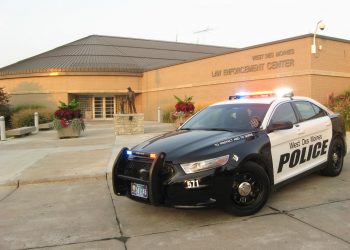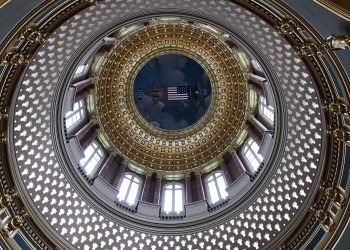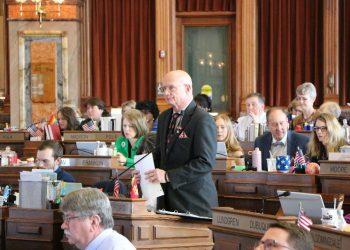DES MOINES, Iowa – The Iowa House State Government Committee on Wednesday voted 20 to 1 to pass HSB 155, a bill that would require public and nonpublic accredited schools to offer the Pledge of Allegiance and display the American flag in every classroom.
The legislation also offers exemptions for nonpublic schools with a religious objection, and the bill does not require students to participate in reciting the pledge.
“This bill was written not only to put the Pledge of Allegiance in our schools but also protect the First Amendment rights of all who are involved,” State Rep. Carter Nordman, R-Adel, who managed the bill in committee, said.
“This bill is long overdue as Iowa is one of the few states that does not have language in its code regarding the Pledge of Allegiance in schools,” he added.
According to Scott Bomboy of the National Constitution Center, Iowa joins two other states, Vermont and Wyoming, that does not have any law regarding the Pledge of Allegiance.
The U.S. Supreme Court, in their 1943 West Virginia State Board of Education v. Barnette ruling, said schools could not punish students for not reciting the pledge.
State Rep. Bruce Hunter, D-Des Moines, was the only one to oppose the bill. He asked Nordman, “If a student decides to kneel during the pledge of allegiance, what’s going to happen?”
“I don’t see this as a political issue. Nothing will happen to them. As I just stated in the bill, they are not required to stand. They’re not required to recite. They can sit out and do whatever they choose to do. But I don’t see this as a political issue,” Nordman answered.
“I’m glad we don’t see a political issue, but it’s going to turn into a political issue whether we like it or not,” Hunter responded.
He said he could “almost guarantee” if a student kneeled during the pledge that someone will object. If not an outside party, then someone from within the school like the students’ classmates.
“I know it says voluntary in the bill. In reality, it’s not voluntary,” Hunter said.
“I can almost guarantee that if there’s a fifth grader or a third grader, or whoever, that decides to either sit at their desk and not say the pledge, stand up and not say the pledge, kneel, whatever, they’re going to get bullied or intimidated, and everything under the sun, by their classmates until they involuntary do the Pledge of Allegiance. That is reality,” he added.
Hunter said there are better ways to teach patriotism.
“We can do it by being honest, not only in classrooms, but in the, in the home and everywhere, about what is really great about America, what makes America great, but also what our faults are, and what we can do as individuals and as students and as parents and as teachers to maybe overcome those faults,” he added.
State Rep. Christina Bohannan, D-Iowa City, said Supreme Court’s Tinker v. Des Moines Independent School District allows non-disruptive student protest. She believed that would address any potential problems that could arise.
“We’ve been putting a lot of mandates and prohibitions on schools lately. And generally, I think it’s better to let school districts decide some of these things for themselves. But on the whole, I’m in support of this bill,” she said. “A lot of states already do this, most states, an overwhelming majority of states already do this. And a lot of the school districts around Iowa already do this,” she said.
Bohannan pointed out that students can’t be compelled to be patriotic.
“Under this law, whether students will participate in the Pledge of Allegiance is purely voluntary. We can’t force them to say it, and we can’t force them to feel it. If we want kids to feel it, we have to go beyond asking them to recite words about democracy and justice. We have to show them those words in action,” she said.
“They have to see that those words are the real America day in and day out, not just for some, but for all. That means we have to protect equal rights for every person. We have to ensure justice under the law. We have to uphold our democracy and respect the results of free and fair elections. In short, we have to ensure that, as the Pledge of Allegiance says, we have a republic with liberty and justice for all. If we do that, the allegiance will follow,” Bohannan added.
State Rep. Jon Jacobsen, R-Council Bluffs, said that he isn’t concerned about students kneeling.
“I’m not quite as concerned about this tripping and becoming a threshold issue because kneeling usually connotates a prayer. And that is something philosophically and vehemently opposed in our current culture of government schooling,” he said.
State Rep. Tom Moore, R-Griswold, says he believed schools would use the Pledge of Allegiance as a learning opportunity.
“I think we shortchange our educators or school boards, our teachers, and our students, when I when we think that this is not going to be used as a learning opportunity to teach patriotism to go through what that pledge actually means to us as American citizens. I think our school districts will use this as an opportunity, not as just an act that they have to do on a daily basis,” he said.
Nordman gave closing comments on the bill.
“It is my belief that the pledge of allegiance is something that can unite all Americans, regardless of your race, religion, age, sexual orientation, or ideology, aligning ourselves with just about every other state in this country. By adding this language to our code. I believe we’re doing a service to our schools, our state, and our country,” he said.
After the vote, State Rep. Bobby Kaufmann, R-Wilton, who chairs the committee, offered a backhanded compliment to Hunter, the only member to vote no on the legislation.
“Representative Hunter, I want to complement you because I only know you to have the skill set to make the pledge as political as you just did,” he said.
No lobbying group registered opposition to the bill, and the Iowa State Education Association, the state’s largest teacher’s union, registered support.
The bill is now qualified for debate and a vote on the Iowa House floor.














